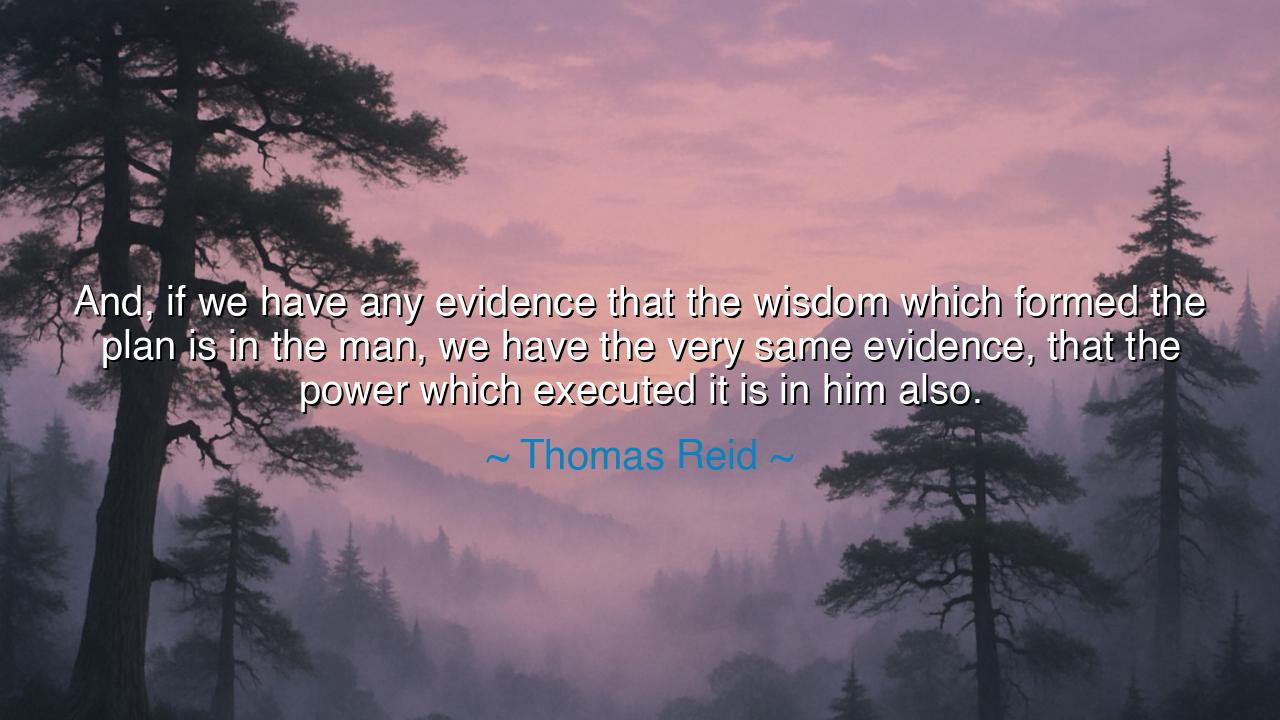
And, if we have any evidence that the wisdom which formed the
And, if we have any evidence that the wisdom which formed the plan is in the man, we have the very same evidence, that the power which executed it is in him also.






Thomas Reid, that grave philosopher of Scotland, speaks with the voice of reason wrapped in majesty. He proclaims that when we see the wisdom which forms a great plan shining forth from a man, we have at the same moment the proof of his power—for he who conceives nobly also holds within him the strength to bring it to life. In this, Reid unites thought and deed, showing that true greatness is never divided: to plan without the power to act is emptiness, and to act without the vision of wisdom is mere chaos.
The ancients understood this unity well. Consider Alexander the Great, who dreamed of conquering Asia before his beard had fully grown. It was not a dream of folly, for within him burned both the clarity of the plan and the vigor of the execution. When he crossed the Hellespont with a mere handful of soldiers, the world might have mocked his vision. Yet the same evidence that his mind conceived empire was the very evidence that his arm would seize it. Thus, in him, as Reid declares, wisdom and power were one flame.
This teaching reminds us that men are not judged by their words alone. Many speak with the tongue of eloquence, yet their lives yield no fruit. But when a man not only declares his design but walks in it, suffers for it, and achieves it, then we know the design was true, and the power to fulfill it dwelt in him from the beginning. Evidence of wisdom is therefore not a faint shadow; it is the herald of deeds to come.
History also reveals the opposite: those who pretend to plans beyond their capacity fall into ruin. Think of Napoleon’s march into Russia. The vision was grand, but the wisdom of the plan was wanting, and so the power to carry it through proved hollow. His soldiers perished in snow and famine, and the empire he sought to secure crumbled. Thus Reid’s words remind us that a plan without true wisdom is a curse, for it gives no sure sign of power.
Let the children of tomorrow learn this: do not separate thought from action. If you would be counted among the noble, let your wisdom be living, clothed in power, so that your plans are not castles in the clouds but fortresses upon the earth. For the evidence of one is the seed of the other, and the union of both is the mark of greatness.






TMTran Manh
This quote makes me reflect on leadership and responsibility. If the capacity to plan is evidence of the capacity to act, does this place moral or practical accountability squarely on the individual? It seems to suggest that genius or insight is incomplete if it is not matched by action. I’m curious whether Reid’s perspective underestimates external factors, or if he intentionally emphasizes the internal power of human agency.
NQHuy Nguyen Quang
What strikes me is the confidence in human capability that Reid expresses. It feels almost idealistic—assuming that a person’s foresight guarantees their ability to act effectively. I’d like to ask: how does this view reconcile with repeated failures or misjudgments? Can wisdom exist without effective execution, or is Reid arguing that true wisdom is always paired with the practical ability to implement it?
HL14 - 12TH2 - Tran Dang Hien Long
I find this statement fascinating because it implies a kind of self-sufficiency in human ability. Reid seems to equate the presence of wisdom with the potential for power. Does that mean knowing what to do is nearly synonymous with being able to do it? I’m curious how this applies in real-world scenarios, where complexity, resources, and circumstances can derail even the most intelligent plans.
TGHo Thi Giap
This quote makes me consider the relationship between planning and execution. Thomas Reid seems to suggest that the ability to conceive a plan inherently demonstrates the ability to carry it out. I wonder, though, if that assumption always holds true. Can someone be brilliant in strategy but fail in execution due to unforeseen obstacles or lack of discipline? It raises questions about how wisdom and action intersect in practical life.